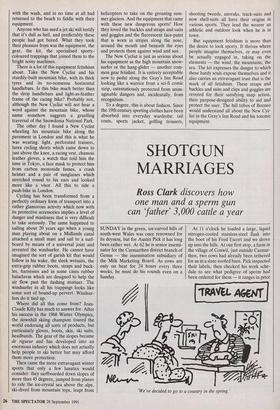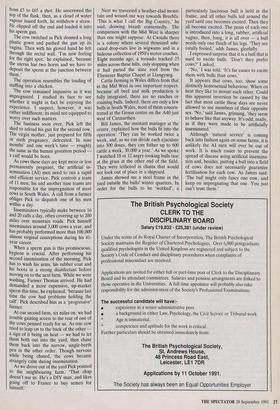SHOTGUN MARRIAGES
Ross Clark discovers how
one man and a sperm gun can 'father' 3,000 cattle a year
SUNDAY in the green, ice-carved hills of south-west Wales was once renowned for its dryness, but for Austin Pick it has long been rather wet. At 62 he is senior insemi- nator for the Carmarthen district branch of Genus — the insemination subsidiary of the Milk Marketing Board. As cows are only on heat for 24 hours every three weeks, he must do his rounds even on a Sunday. At 11 o'clock he loaded a large, liquid nitrogen-cooled stainless-steel flask into the boot of his Ford Escort and we drove up into the hills. At our first stop, a farm in the village of Conwil, just outside Carmar- then, two cows had already been tethered for us in a slate-roofed barn. Pick inspected their labels, then checked his work sche- dule to see what pedigree of sperm had been ordered for them — it ranges in price 'We've decided to go to a country in the spring.' from £5 to £65 a shot. He unscrewed the top of the flask, then, as a cloud of water vapour issued forth, he withdrew a straw. He clipped off the end and loaded it into his sperm gun. The cow twitched as Pick donned a long plastic gown and pushed the gun up its vagina. Then with his gloved hand he felt through the rectal wall. 'I'm now feeling for the right spot,' he explained, 'because the uterus has two horns and we have to deposit the sperm at the junction between them.'
The operation resembles the loading of stuffing into a chicken.
The cow remained impassive as it was impregnated. I studied its face to see whether it might in fact be enjoying the experience. I suspect, however, it was rather indifferent; its mind not equipped to worry over such matters.
The business soon over, Pick left the shed to reload his gun for the second cow. The virgin mother, just prepared for fifth or sixth pregnancy, defecated. In nine months' and one week's time — roughly the same as the human gestation period a calf would be born.
As cows these days are kept more or less permanently pregnant, the artificial in- semination (AI) men need to run a rapid and efficient service. Pick controls a team of 11 men; his and another nine teams are responsible for the impregnation of most cows in South Wales. A call from a farmer obliges Pick to dispatch one of his men within a day.
Inseminators typically make between 16 and 20 calls a day, often covering up to 200 miles over mountain roads. Pick himself inseminates around 3,000 cows a year, and has probably performed more than 100,000 almost virginal conceptions during his 41- year career.
When a sperm gun is this promiscuous, hygiene is crucial. After performing his second insemination of the morning, Pick has to wash his arms, his rubber coat and his boots in a strong disinfectant before moving on to the next farm. While we were washing, Farmer Thomas arrived. He had demanded a more expensive, up-market sperm this time, he explained, 'because last time the cow had problems holding the calf. Pick described him as a 'progressive' farmer.
At our second farm, six miles on, we had trouble gaining access to the rear of one of the cows penned ready for us. As one cow tried to leap on to the back of the other a sign of it being on heat — we had to let them both out into the yard, then chase them back into the narrow, single-berth pen in the other order. Though nervous while being chased, the cows became strangely calm during insemination. As we drove out of the yard Pick pointed to the neighbouring farm. 'That chap doesn't use us. He's a DIY man, and likes going off to France to buy semen for himself.' Next we traversed a heather-clad moun- tain and wound our way towards Brechfa. `This is what I call the Big Country,' he said, drawing breath contentedly. The comparison with the Mid West is sharper than one might suppose. At Cwmdu there is a colony where several thousand edu- cated drop-outs live in wigwams and in a hideous collection of 1950's motor coaches. Eight months ago, a tornado tracked 25 miles across these hills, only stopping when it had parted the slate roof from the Ebenezer Baptist Chapel at Llangynog.
Cattle farming in Wales differs from that in the Mid West in one important respect: because all beef and milk production is fully integrated, there are no ranches or roaming bulls. Indeed, there are only a few bulls in South Wales, most of them concen- trated at the Genus centre on the A40 just west of Carmarthen.
Bill James, the assistant manager at the centre, explained how the bulls fit into the operation: 'They can be worked twice a week, and, as we can divide each ejaculate into 300 doses, they can father up to 600 cattle a week, 30,000 a year.' As we spoke I watched 10 or 12 angry-looking bulls tear at the grass at the other end of the field. They were tethered in chains that would not look out of place in a shipyard.
James showed me a steel frame in the yard outside the bulls' winter quarters. In order for the bulls to be 'worked', a particularly lascivious bull is held in the frame, and all other bulls led around the yard until one becomes excited. Then they all become excited. The penis of each one is introduced into a long, rubber, artificial vagina, then, bang, it is all over — a bull needs only one flinch of his legs. 'They are totally fooled,' adds James, gleefully.
I expressed surprise that it is a bull that is used to excite bulls. 'Don't they prefer cows?' I asked.
`No,' I was told. 'It's far easier to excite them with bulls than cows.'
It appears that cows, too, show some distinctly homosexual behaviour. When on heat they like to mount each other. Could this apparent inversion be caused by the fact that most cattle these days are never allowed to see members of their opposite sex. 'No,' said James, grinning, 'they seem to behave like that anyway. It's odd, really, as if they were made to be artificially inseminated.'
Although 'natural service' is coming back into fashion again on some farms, it is unlikely the AI men will ever be out of work. It is much easier to prevent the spread of disease using artificial insemina- tion and, besides, putting a bull into a field of cows does not necessarily guarantee fertilisation for each cow. As James said: `The bull might only fancy one cow, and keep on impregnating that one. You just can't trust them.'



































































 Previous page
Previous page